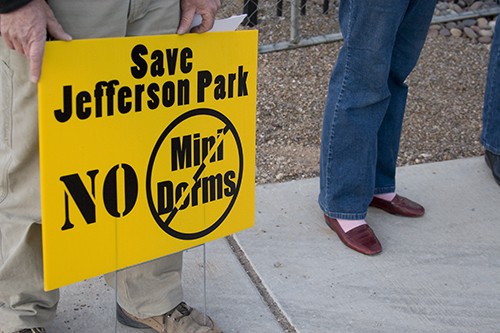Students living in Jefferson Park mini-dorms are violating the city’s zoning code, according to a determination by the zoning administrator on March 14 — a decision that one councilman called a “”Pandora’s box.””
The determination found the use of mini-dorms built by developer Michael Goodman do not meet the requirements of R-1 zoning, which stipulates single-family residences. Groups of unrelated students living together do not comply with this zoning, though representatives of the city of Tucson are unsure of how far the ruling will extend.
The controversy between residents of Jefferson Park Neighborhood and mini-dorm developers spans nearly a decade, resulting in a design manual that received preliminary approval from the City Council. The Jefferson Park Neighborhood Association filed its first complaint regarding the use of mini-dorms with the city of Tucson zoning administrator in January.
Zoning Administrator Craig Gross wrote in his determination that Goodman’s mini-dorms do not comply with single-family residential zoning because they “”are occupied by multiple college students, typically unrelated in any manner other than their desire to reside near a university they attend.”” He also noted the use violates zoning regulations because rent is collected from individual tenants, bedrooms are individually keyed and residents are not bound by “”legal, social or moral commitment.””
Goodman has 30 days to appeal the decision to the city Board of Adjustment. It may eventually reach the state supreme court, according to Ernie Duarte, director for the Planning and Development Services Department.
Councilman Steve Kozachik said the determination could affect students living in these houses, though no decisions have been made.
“”If I was a student, I’d be looking over my shoulder asking, ‘What now?'”” he said.
Duarte said the implications of the determination and how it will be enforced are not clear yet.
“”It’s hard to say at this point,”” he said. “”Part of the discussion we’re going to have with the council is just how far-reaching this determination will be. I think enforcement of this provision is going to be key and really up for debate at this point.””
The determination will be discussed in an executive session of the city council next week, according to Duarte.
“”Our council wanted to hear the legal implications of this decision in closed session,”” he said.
Kozachik said he questions the timing of the decision and said he thinks it should have been made when the controversy first started 10 years ago. The city granted developers like Goodman permits to build these structures many times even after their use was clear.
“”Now we’re a decade down the road,”” Kozachik said. “”Millions of dollars have been invested and tons of homes have been demolished. And now the city says, ‘Oh, we’ve changed our minds.’ I don’t even know how to describe this decision.””
Councilwoman Karin Uhlich said the determination will help protect the neighborhood from mini-dorm construction in the future.
“”For better or for worse, the right questions have been raised and now answered,”” Uhlich said. “”I think it’s an important one.””
Uhlich said she thinks the determination should be grandfathered in so it does not affect current lease holders. She said she does not think the ruling will affect students who live together in smaller houses because they do not fit the characteristics of mini-dorms such as having individually-keyed bedrooms.
“”I don’t think the ruling has those implications,”” Uhlich said.
Jefferson Park resident Bob Schlanger said the complaint filed by the neighborhood association was intended to target mini-dorms and not students living in two or three-bedroom houses.
“”I don’t necessarily have a problem with that,”” he said.
Schlanger said the decision validates the concerns of long-term residents, though the determination regards the use of mini-dorms and not the structures themselves.
“”It’s pretty clear what the intent is,”” he said. “”I hope the decision maintains it’s not legal in R-1 and R-2 zoning.””
Local developer John Lee said the determination will require the city to use resources for enforcement of the ruling and to fight a lawsuit against Goodman.
“”All of these resources are sacrificed to determining who’s a family and who’s not,”” he said.
Lee said determining who is or is not a family would be difficult when leasing to students.
“”It gives the city the ability to get into people’s living arrangements,”” he said. “”What is a family? What is a head of household?””
The determination could allow the city to look at people’s leases and the way they’re running their households every time the city gets a complaint, Kozachik said.
“”The ruling opens up such a Pandora’s box,”” he said.









